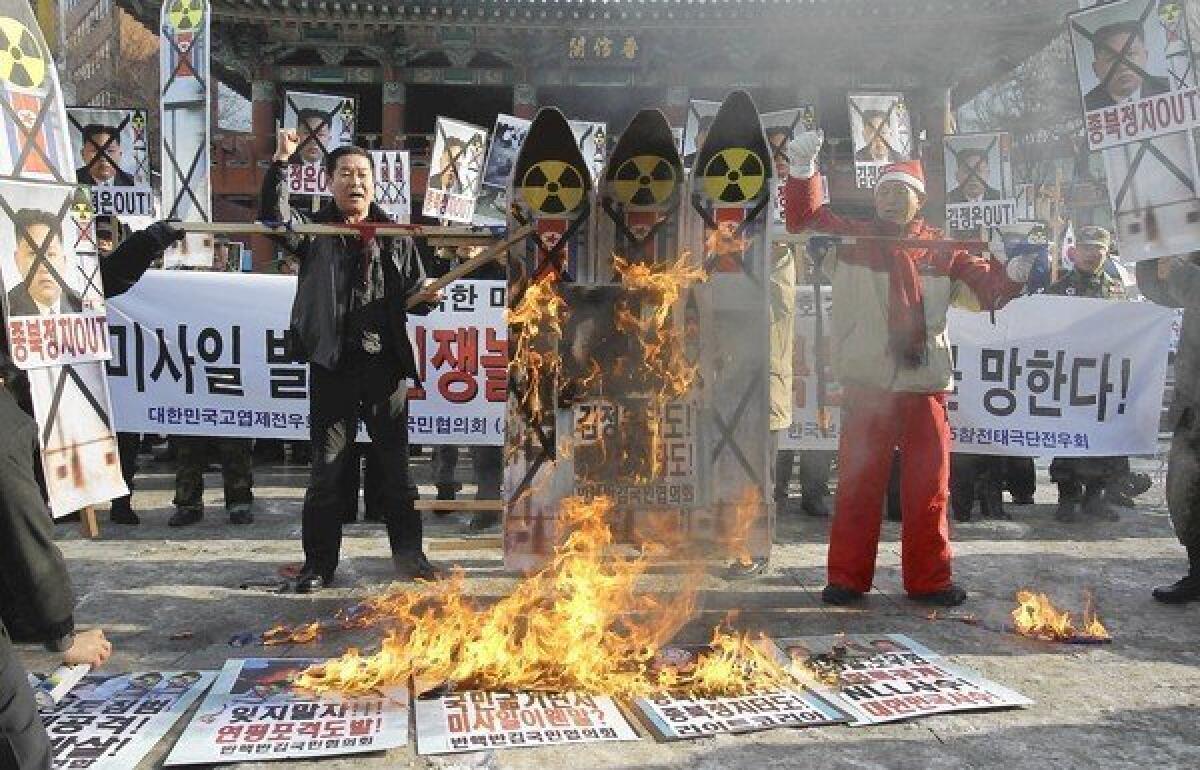U.S. wants collective effort to rein in North Korea

- Share via
WASHINGTON — Obama administration officials said they intend to put more energy into working with other major powers, especially China, to pressure impoverished North Korea with new sanctions following Pyongyang’s defiant launch of a long-range rocket.
U.S. officials huddled at the United Nations Security Council to try to work out an agreement on new penalties that could generate change by the government in North Korea, which is already the most heavily sanctioned country in the world.
The major powers may seek to further pare North Korea’s limited financial ties with the outside world and impose more intrusive inspections on its sea and air cargo to prevent proliferation of weapons and other illegal goods, officials said.
“North Korea will only truly strengthen itself by abiding by international norms, living up to its commitments and international obligations, and working to feed its citizens, to educate its children, and to win the trust of its neighbors,” said Tommy Vietor, spokesman for the U.S. National Security Council.
Defense Secretary Leon E. Panetta told CNN that the U.S. was still assessing Wednesday’s rocket launch, which apparently resulted in North Korea’s successful deployment of a satellite into orbit. North Korea says the launch was for peaceful scientific purposes, but the U.S. and other countries say it could be a step toward Pyongyang building an intercontinental ballistic missile.
Panetta, in an interview from Afghanistan, said the United States was boosting its military presence in the region. “One of the reasons we’re rebalancing in the Pacific is to deal with the threat from North Korea,” he said.
Administration officials generally have treated the threat from Pyongyang as an important but second-tier security issue.
A North Korean launch in April resulted in that rocket breaking into pieces and falling into the Yellow Sea after flying less than two minutes. But with the launch Wednesday, it appears the regime has taken a major step toward the capability to carry a nuclear warhead to the United States, building pressure on the White House to reconsider a policy that has so far failed to slow the communist nation’s rocket program.
The launch is worrisome, experts say, not only because of what North Korea might do with the technology, but because the cash-starved regime might sell the technology to past customers of its missile hardware, such as Iran.
“The administration is really going to have to think long and hard about whether there ought to be a sea change in how they look at things,” said Victor D. Cha, a senior Asia advisor to the George W. Bush White House who is now with the Center for Strategic and International Studies in Washington. The North Koreans “crossed a technological threshold that no other non-allied country except China and the Soviet Union have crossed.”
The administration has tried sanctions as well as incentives to change North Korea’s course over the last four years, with little success. Its overarching approach has been “strategic patience”: It has been waiting for the regime of Kim Jong Un, who became the country’s leader after his father died last year, to demonstrate it was willing to negotiate with world powers on its nuclear and missile programs.
In 2005, the United States threatened to clamp down on Banco Delta Asia, an obscure Macao-based bank that Pyongyang had used as a lifeline. The U.S. threat caused other institutions to drop their business dealings with North Korea, prompting angry threats from the regime.
It’s not clear whether the United States still has the ability to frighten off lenders as it did then, since it ended up giving North Korea back the funds it had frozen, said Gordon Flake, a longtime Korea expert and executive director of the Maureen and Mike Mansfield Foundation in Washington.
Also unclear is to what extent China will cooperate in cutting off North Korea’s vital trade. Beijing signed on to a U.N. Security Council resolution in April that made new sanctions automatic if North Korea launched another rocket, and Beijing condemned this week’s launch both before and after it happened.
Yet China fears a collapse of North Korea, and has been reluctant to squeeze it too hard. Just as with Iran, China has backed international sanctions while quietly seeking a way to limit their effects.
“I see this first and foremost as a challenge for the new Chinese government,” Flake said.
Some former officials and analysts wonder how much energy the administration will put into the issue, at a time when it is overbooked with domestic concerns and foreign policy crises in Iran, Syria and elsewhere.
Though the White House denounced the launch as “provocative” and said it would work with Asian powers and the Security Council to determine “appropriate action,” analysts noted that President Obama did not appear personally to express his concern about the issue, as he did last week regarding the threat of Syria’s use of chemical weapons.
Philip Yun, a former advisor to ex-Defense Secretary William Perry and now the executive director of the pro-arms-control Ploughshares Fund, said the short-term risks are minimal, since Pyongyang still must overcome a series of complex technical hurdles to be able to miniaturize and deliver a nuclear weapon.
But over the long term, he said, “this is a reminder that we can’t do nothing — we’ve got to start taking the North Koreans seriously.”
More to Read
Sign up for Essential California
The most important California stories and recommendations in your inbox every morning.
You may occasionally receive promotional content from the Los Angeles Times.











